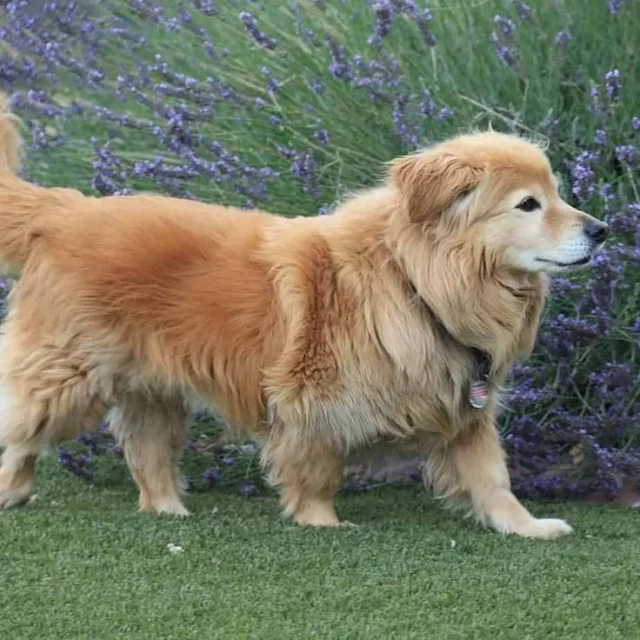Golden Retriever Corgi Dog Breed Information:
The Golden Retriever Corgi is a mixed breed dog a cross between the Corgi and Golden Retriever dog breeds. Loyal, silly, and active, these pups inherited some of the best qualities from both of their parents. Golden Retriever Corgis go by several names, including the Golden Corgi, Corgi Retriever, and the Corgi Golden Retriever.
Golden Retriever Corgi Dog Group: Mixed Breed Dogs.
Golden Retriever Corgi Height: 10 to 18 inches.
Golden Retriever Corgi Weight: 30 to 75 pounds.
Golden Retriever Corgi Life Span: 10 to 13 years.
More About This Dog Breed:
The main colors of Golden Corgis are golden, tan, fawn, red, white, black, and brown. Sometimes their coats are solid, and sometimes they have a mix of colors. The Golden Retriever Corgi is a mixed breed dog. They are not purebreds like their Golden Retriever and Corgi parents. These dogs tend to do well with other animals and pets in the household.
Golden Retriever Corgi History:
The Golden Retriever Corgi mixed dog breed may have existed naturally over the years, but designer breeders started intentionally mixing Corgis and Golden Retrievers in the late 1990s, likely in North America. Breeders wanted to mix the two parent breeds to combine the friendly, outgoing demeanor of both dogs. They continued to create Golden Retriever Corgis as demand for the mixed breed pups climbed.
Golden Retriever Corgi Size:
Golden Corgis weigh in anywhere between 30 and 75 pounds and stand ten to 18 inches from the shoulder. However, many can be smaller or larger than average.
Golden Retriever Corgi Personality:
Many Golden Retriever Corgi lovers describe their dogs as spunky, silly dogs who have a lot of love to give. Although they can be anywhere between 30 and 75 pounds, many of them may still think they're lapdogs and try to snuggle up close to their favorite humans. The Golden Retriever Corgi can be playful, bordering on stubborn. They will test novice owners every once in a while with some silly antics, but again, proper training should curb any irksome habits or stubbornness.
Also Read This : All Dog Breeds - Names and Pictures | Complete List of Dog Profiles
Golden Retriever Corgi Health:
The Golden Retriever Corgi mixed breed is predisposed to some of the same conditions that the Corgi and Golden Retriever also face. While most are generally healthy, some may be prone to a few health issues:
Heat stroke.
Cataracts.
Hip and elbow dysplasia.
Golden Retriever Corgi Care:
As with all dogs, you should keep up with your Golden Retriever Corgi's regular veterinary checkups to detect any health concerns early. Make sure your dog gets at least one good half-hour- to hour-long walk per day with a few good, active play sessions and shorter walks mixed in. Check their ears for debris and pests daily and clean them as recommended by your vet. You should brush your dog's teeth daily, as smaller breeds are prone to dental issues.
Golden Retriever Corgi Feeding:
An ideal Golden Retriever Corgi diet should be formulated for a medium-to-large breed with high energy. They have a tendency to gain weight if they're overfed, so you should stick to a regular feeding schedule and not leave food out during the day.
Golden Retriever Corgi Coat Color And Grooming:
The main colors of Golden Corgis are golden, tan, fawn, red, white, black, and brown. Sometimes their coats are solid, and sometimes they have a mix of colors. The exact Corgi parent be it a Pembroke Welsh or Cardigan Welsh Corgi--will also help determine the Golden Corgi's colors. Because they have longer double coats, Golden Retriever Corgis are much more tolerant of the coat than of extreme heat. Do not leave your Golden Corgi unattended in any extreme weather conditions, especially in warm conditions, which could lead to heatstroke.
Golden Retriever Corgi with Children And Other Pets:
The Golden Corgi tends to be an excellent active companion for both young and older children alike. Golden Corgis might not get along with other dogs and cats, so it really comes down to training and socialization.

